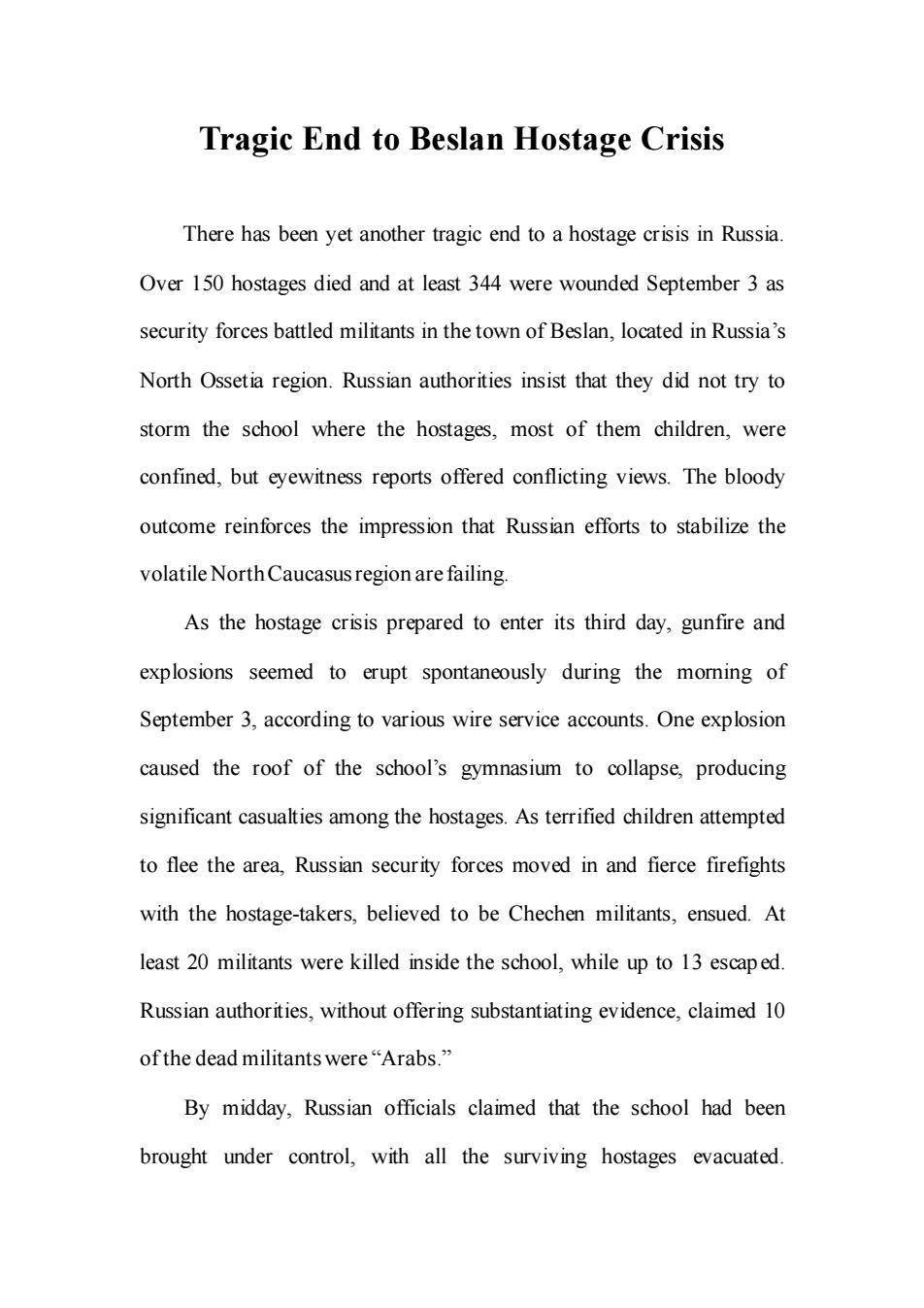
Tragic End to Beslan Hostage Crisis There has been yet another tragic end to a hostage crisis in Russia. Over 150 hostages died and at least 344 were wounded September 3 as security forces battled militants in the town of Beslan,located in Russia's North Ossetia region.Russian authorities insist that they did not try to storm the school where the hostages,most of them children,were confined,but eyewitness reports offered conflicting views.The bloody outcome reinforces the impression that Russian efforts to stabilize the volatile North Caucasus region are failing As the hostage crisis prepared to enter its third day,gunfire and explosions seemed to erupt spontaneously during the morning of September 3,according to various wire service accounts.One explosion caused the roof of the school's gymnasium to collapse,producing significant casualties among the hostages.As terrified children attempted to flee the area,Russian security forces moved in and fierce firefights with the hostage-takers,believed to be Chechen militants,ensued.At least 20 militants were killed inside the school,while up to 13 escaped. Russian authorities,without offering substantiating evidence,claimed 10 ofthe dead militants were“Arabs.” By midday,Russian officials claimed that the school had been brought under control,with all the surviving hostages evacuated
Tragic End to Beslan Hostage Crisis There has been yet another tragic end to a hostage crisis in Russia. Over 150 hostages died and at least 344 were wounded September 3 as security forces battled militants in the town of Beslan, located in Russia’s North Ossetia region. Russian authorities insist that they did not try to storm the school where the hostages, most of them children, were confined, but eyewitness reports offered conflicting views. The bloody outcome reinforces the impression that Russian efforts to stabilize the volatile North Caucasus region are failing. As the hostage crisis prepared to enter its third day, gunfire and explosions seemed to erupt spontaneously during the morning of September 3, according to various wire service accounts. One explosion caused the roof of the school’s gymnasium to collapse, producing significant casualties among the hostages. As terrified children attempted to flee the area, Russian security forces moved in and fierce firefights with the hostage-takers, believed to be Chechen militants, ensued. At least 20 militants were killed inside the school, while up to 13 escap ed. Russian authorities, without offering substantiating evidence, claimed 10 of the dead militants were “Arabs.” By midday, Russian officials claimed that the school had been brought under control, with all the surviving hostages evacuated
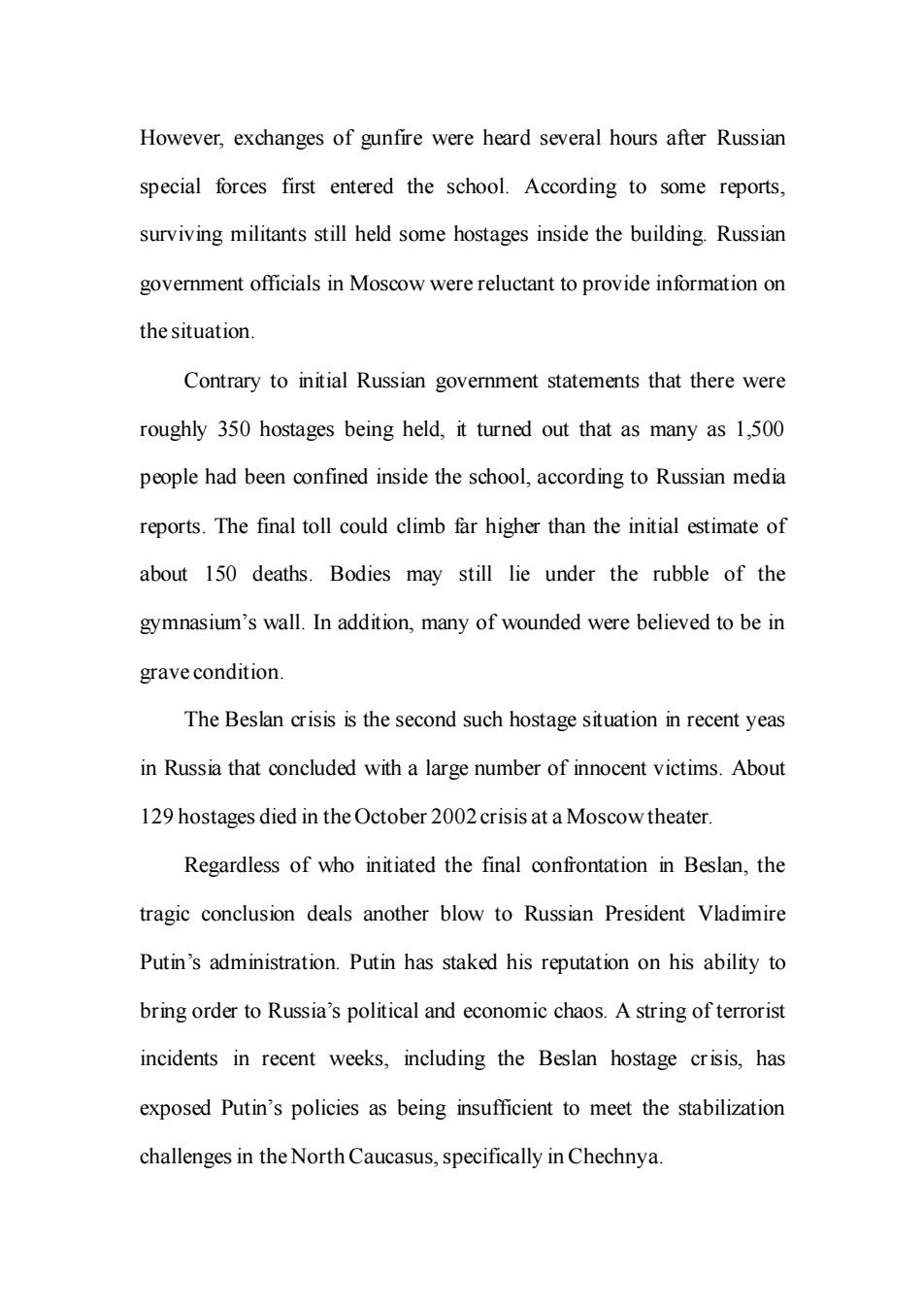
However,exchanges of gunfire were heard several hours after Russian special forces first entered the school.According to some reports, surviving militants still held some hostages inside the building.Russian government officials in Moscow were reluctant to provide information on the situation. Contrary to initial Russian government statements that there were roughly 350 hostages being held,it turned out that as many as 1,500 people had been confined inside the school,according to Russian media reports.The final toll could climb far higher than the initial estimate of about 150 deaths.Bodies may still lie under the rubble of the gymnasium's wall.In addition,many of wounded were believed to be in grave condition. The Beslan crisis is the second such hostage situation in recent yeas in Russia that concluded with a large number of innocent victims.About 129 hostages died in the October 2002 crisis at a Moscow theater Regardless of who initiated the final confrontation in Beslan,the tragic conclusion deals another blow to Russian President Vladimire Putin's administration.Putin has staked his reputation on his ability to bring order to Russia's political and economic chaos.A string of terrorist incidents in recent weeks,including the Beslan hostage crisis,has exposed Putin's policies as being insufficient to meet the stabilization challenges in the North Caucasus,specifically in Chechnya
However, exchanges of gunfire were heard several hours after Russian special forces first entered the school. According to some reports, surviving militants still held some hostages inside the building. Russian government officials in Moscow were reluctant to provide information on the situation. Contrary to initial Russian government statements that there were roughly 350 hostages being held, it turned out that as many as 1,500 people had been confined inside the school, according to Russian media reports. The final toll could climb far higher than the initial estimate of about 150 deaths. Bodies may still lie under the rubble of the gymnasium’s wall. In addition, many of wounded were believed to be in grave condition. The Beslan crisis is the second such hostage situation in recent yeas in Russia that concluded with a large number of innocent victims. About 129 hostages died in the October 2002 crisis at a Moscow theater. Regardless of who initiated the final confrontation in Beslan, the tragic conclusion deals another blow to Russian President Vladimire Putin’s administration. Putin has staked his reputation on his ability to bring order to Russia’s political and economic chaos. A string of terrorist incidents in recent weeks, including the Beslan hostage crisis, has exposed Putin’s policies as being insufficient to meet the stabilization challenges in the North Caucasus, specifically in Chechnya
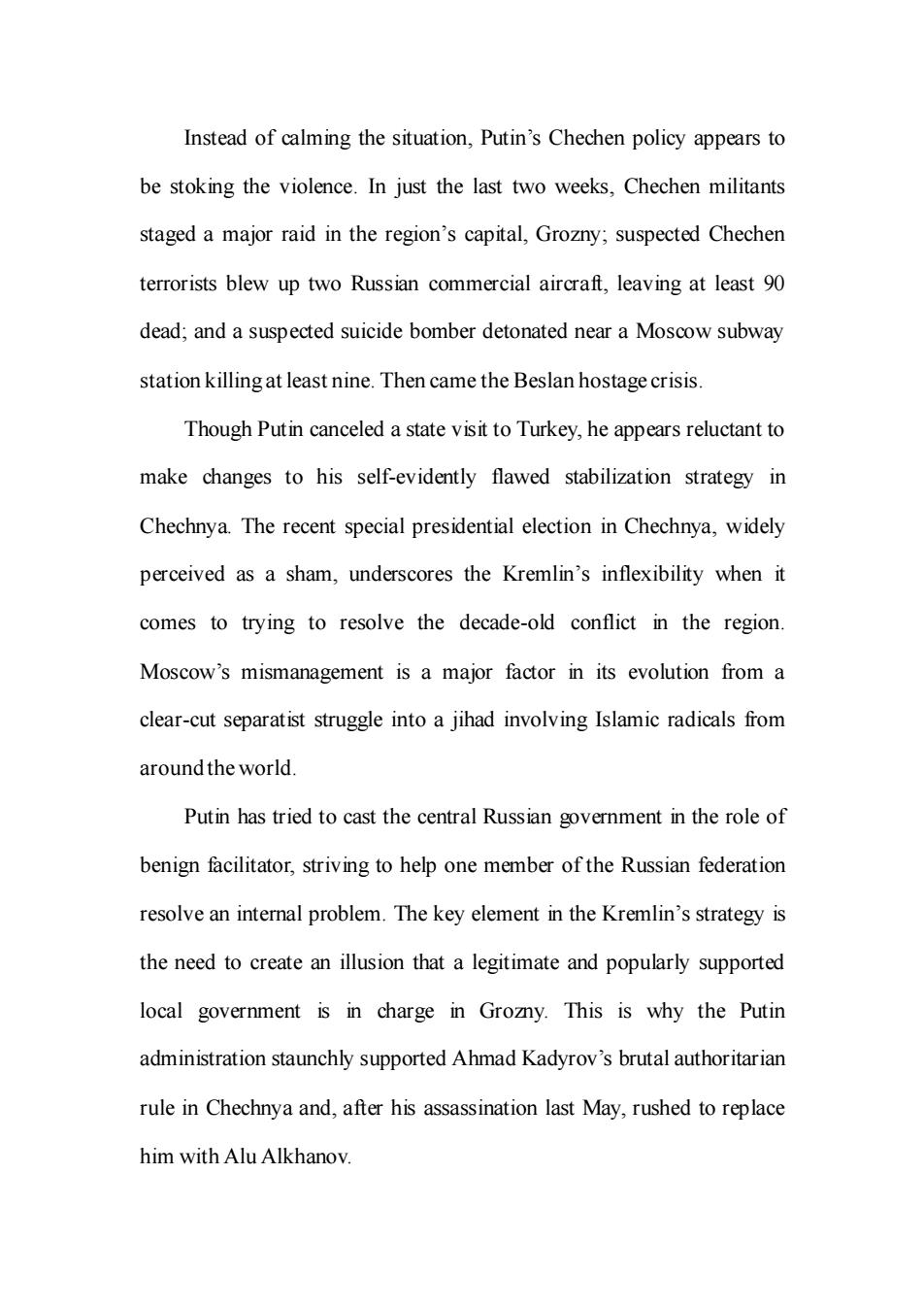
Instead of calming the situation,Putin's Chechen policy appears to be stoking the violence.In just the last two weeks,Chechen militants staged a major raid in the region's capital,Grozny;suspected Chechen terrorists blew up two Russian commercial aircraft,leaving at least 90 dead;and a suspected suicide bomber detonated near a Moscow subway station killing at least nine.Then came the Beslan hostage crisis Though Putin canceled a state visit to Turkey,he appears reluctant to make changes to his self-evidently flawed stabilization strategy in Chechnya.The recent special presidential election in Chechnya,widely perceived as a sham,underscores the Kremlin's inflexibility when it comes to trying to resolve the decade-old conflict in the region. Moscow's mismanagement is a major factor in its evolution from a clear-cut separatist struggle into a jihad involving Islamic radicals from around the world. Putin has tried to cast the central Russian government in the role of benign facilitator,striving to help one member of the Russian federation resolve an internal problem.The key element in the Kremlin's strategy is the need to create an illusion that a legitimate and popularly supported local government is in charge in Grozny.This is why the Putin administration staunchly supported Ahmad Kadyrov's brutal authoritarian rule in Chechnya and,after his assassination last May,rushed to replace him with Alu Alkhanov
Instead of calming the situation, Putin’s Chechen policy appears to be stoking the violence. In just the last two weeks, Chechen militants staged a major raid in the region’s capital, Grozny; suspected Chechen terrorists blew up two Russian commercial aircraft, leaving at least 90 dead; and a suspected suicide bomber detonated near a Moscow subway station killing at least nine. Then came the Beslan hostage crisis. Though Putin canceled a state visit to Turkey, he appears reluctant to make changes to his self-evidently flawed stabilization strategy in Chechnya. The recent special presidential election in Chechnya, widely perceived as a sham, underscores the Kremlin’s inflexibility when it comes to trying to resolve the decade-old conflict in the region. Moscow’s mismanagement is a major factor in its evolution from a clear-cut separatist struggle into a jihad involving Islamic radicals from around the world. Putin has tried to cast the central Russian government in the role of benign facilitator, striving to help one member of the Russian federation resolve an internal problem. The key element in the Kremlin’s strategy is the need to create an illusion that a legitimate and popularly supported local government is in charge in Grozny. This is why the Putin administration staunchly supported Ahmad Kadyrov’s brutal authoritarian rule in Chechnya and, after his assassination last May, rushed to replace him with Alu Alkhanov
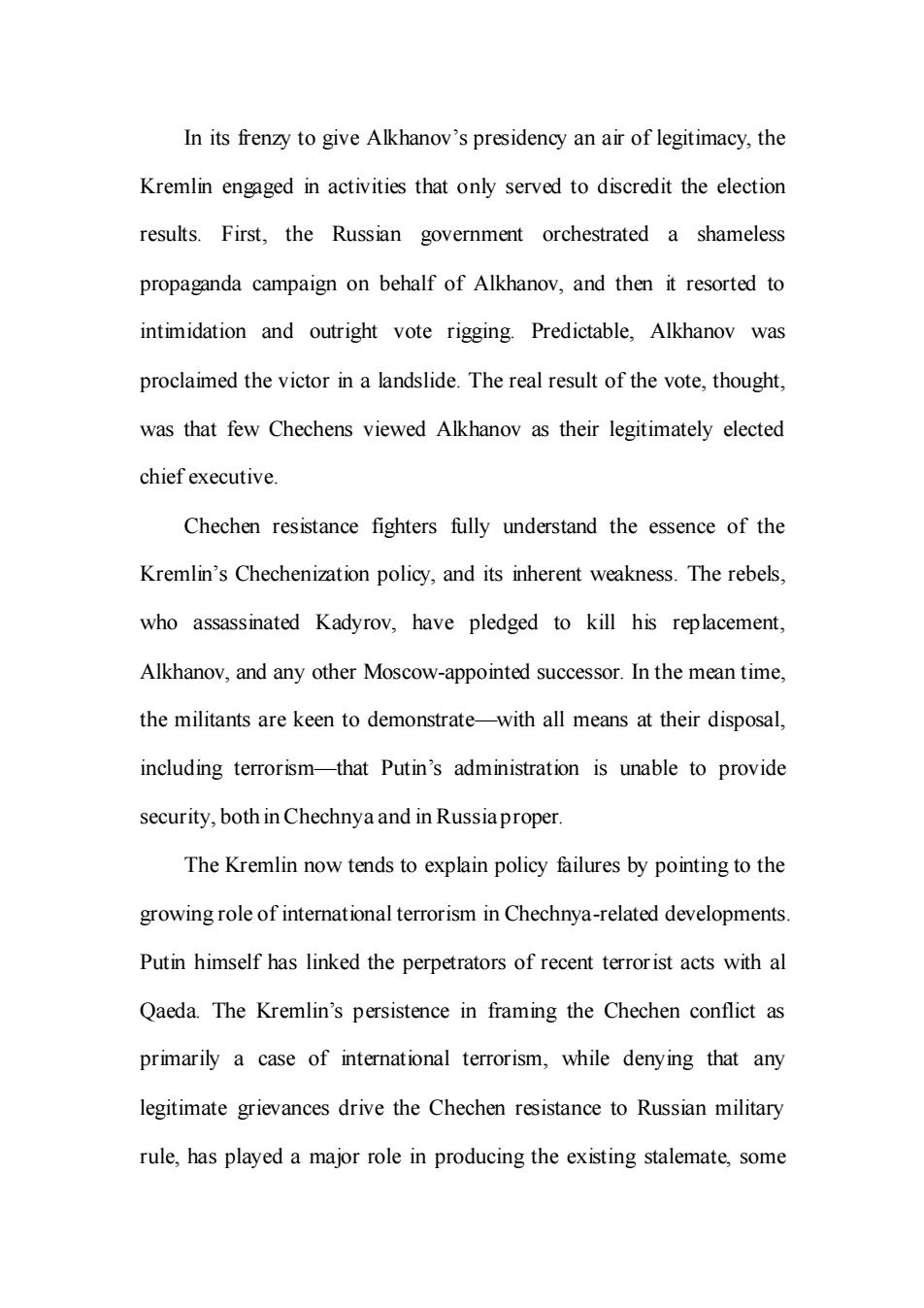
In its frenzy to give Alkhanov's presidency an air of legitimacy,the Kremlin engaged in activities that only served to discredit the election results.First,the Russian government orchestrated a shameless propaganda campaign on behalf of Alkhanov,and then it resorted to intimidation and outright vote rigging.Predictable,Alkhanov was proclaimed the victor in a landslide.The real result of the vote,thought was that few Chechens viewed Alkhanov as their legitimately elected chief executive. Chechen resistance fighters fully understand the essence of the Kremlin's Chechenization policy,and its inherent weakness.The rebels, who assassinated Kadyrov,have pledged to kill his replacement. Alkhanov,and any other Moscow-appointed successor.In the mean time, the militants are keen to demonstrate-with all means at their disposal, including terrorism-that Putin's administration is unable to provide security,both in Chechnya and in Russiaproper. The Kremlin now tends to explain policy failures by pointing to the growing role of international terrorism in Chechnya-related developments Putin himself has linked the perpetrators of recent terror ist acts with al Qaeda.The Kremlin's persistence in framing the Chechen conflict as primarily a case of international terrorism,while denying that any legitimate grievances drive the Chechen resistance to Russian military rule,has played a major role in producing the existing stalemate,some
In its frenzy to give Alkhanov’s presidency an air of legitimacy, the Kremlin engaged in activities that only served to discredit the election results. First, the Russian government orchestrated a shameless propaganda campaign on behalf of Alkhanov, and then it resorted to intimidation and outright vote rigging. Predictable, Alkhanov was proclaimed the victor in a landslide. The real result of the vote, thought, was that few Chechens viewed Alkhanov as their legitimately elected chief executive. Chechen resistance fighters fully understand the essence of the Kremlin’s Chechenization policy, and its inherent weakness. The rebels, who assassinated Kadyrov, have pledged to kill his replacement, Alkhanov, and any other Moscow-appointed successor. In the mean time, the militants are keen to demonstrate—with all means at their disposal, including terrorism—that Putin’s administration is unable to provide security, both in Chechnya and in Russia proper. The Kremlin now tends to explain policy failures by pointing to the growing role of international terrorism in Chechnya-related developments. Putin himself has linked the perpetrators of recent terrorist acts with al Qaeda. The Kremlin’s persistence in framing the Chechen conflict as primarily a case of international terrorism, while denying that any legitimate grievances drive the Chechen resistance to Russian military rule, has played a major role in producing the existing stalemate, some
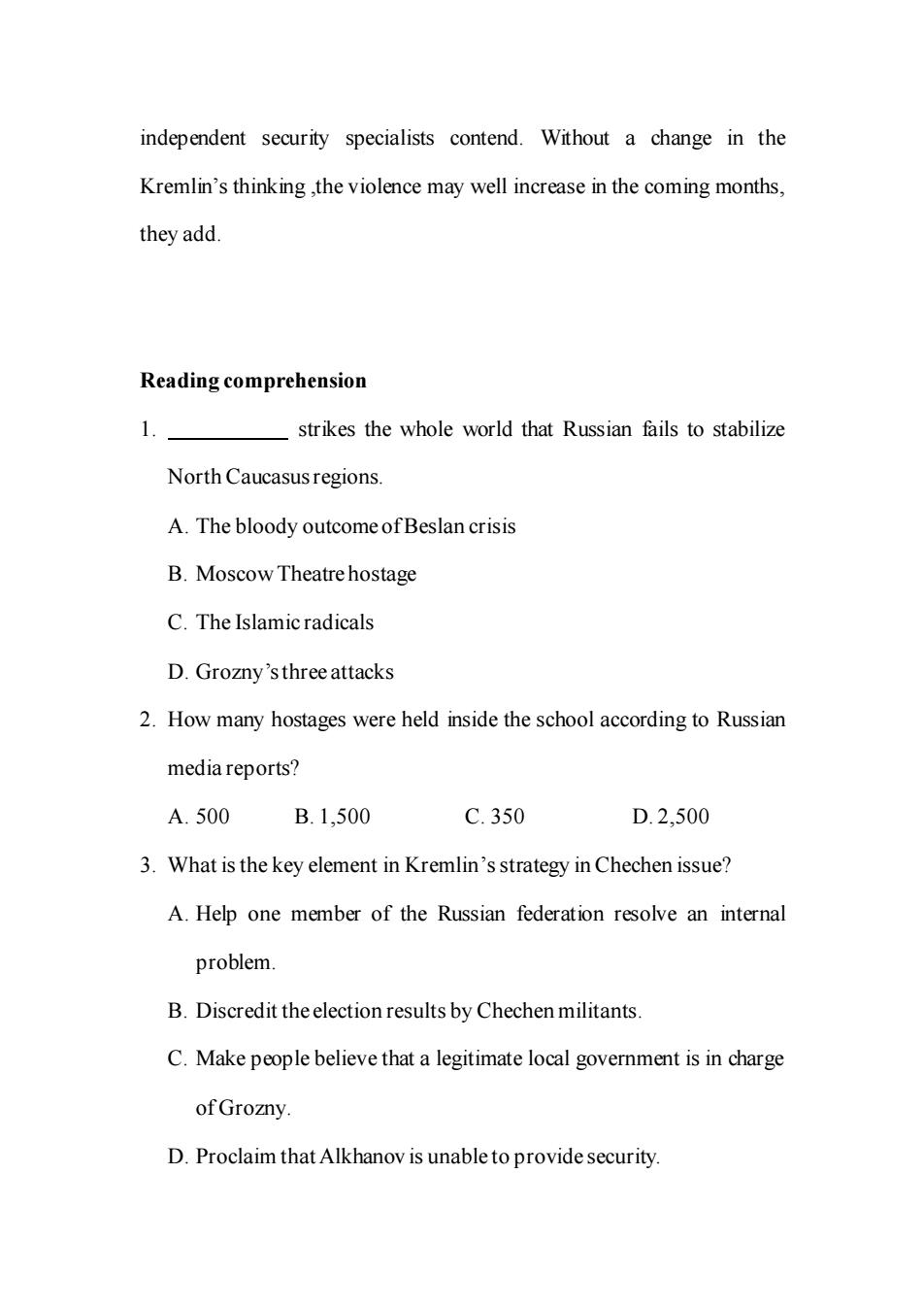
independent security specialists contend.Without a change in the Kremlin's thinking ,the violence may well increase in the coming months, they add. Reading comprehension 1. strikes the whole world that Russian fails to stabilize North Caucasusregions. A.The bloody outcomeofBeslan crisis B.Moscow Theatrehostage C.The Islamic radicals D.Grozny'sthreeattacks 2.How many hostages were held inside the school according to Russian media reports? A.500 B.1,500 C.350 D.2,500 3.What is the key element in Kremlin's strategy in Chechen issue? A.Help one member of the Russian federation resolve an internal problem. B.Discredit theelection results by Chechen militants. C.Make people believe that a legitimate local government is in charge of Grozny. D.Proclaim that Alkhanov is unable to provide security
independent security specialists contend. Without a change in the Kremlin’s thinking ,the violence may well increase in the coming months, they add. Reading comprehension 1. strikes the whole world that Russian fails to stabilize North Caucasus regions. A. The bloody outcome of Beslan crisis B. Moscow Theatre hostage C. The Islamic radicals D. Grozny’s three attacks 2. How many hostages were held inside the school according to Russian media reports? A. 500 B. 1,500 C. 350 D. 2,500 3. What is the key element in Kremlin’s strategy in Chechen issue? A. Help one member of the Russian federation resolve an internal problem. B. Discredit the election results by Chechen militants. C. Make people believe that a legitimate local government is in charge of Grozny. D. Proclaim that Alkhanov is unable to provide security
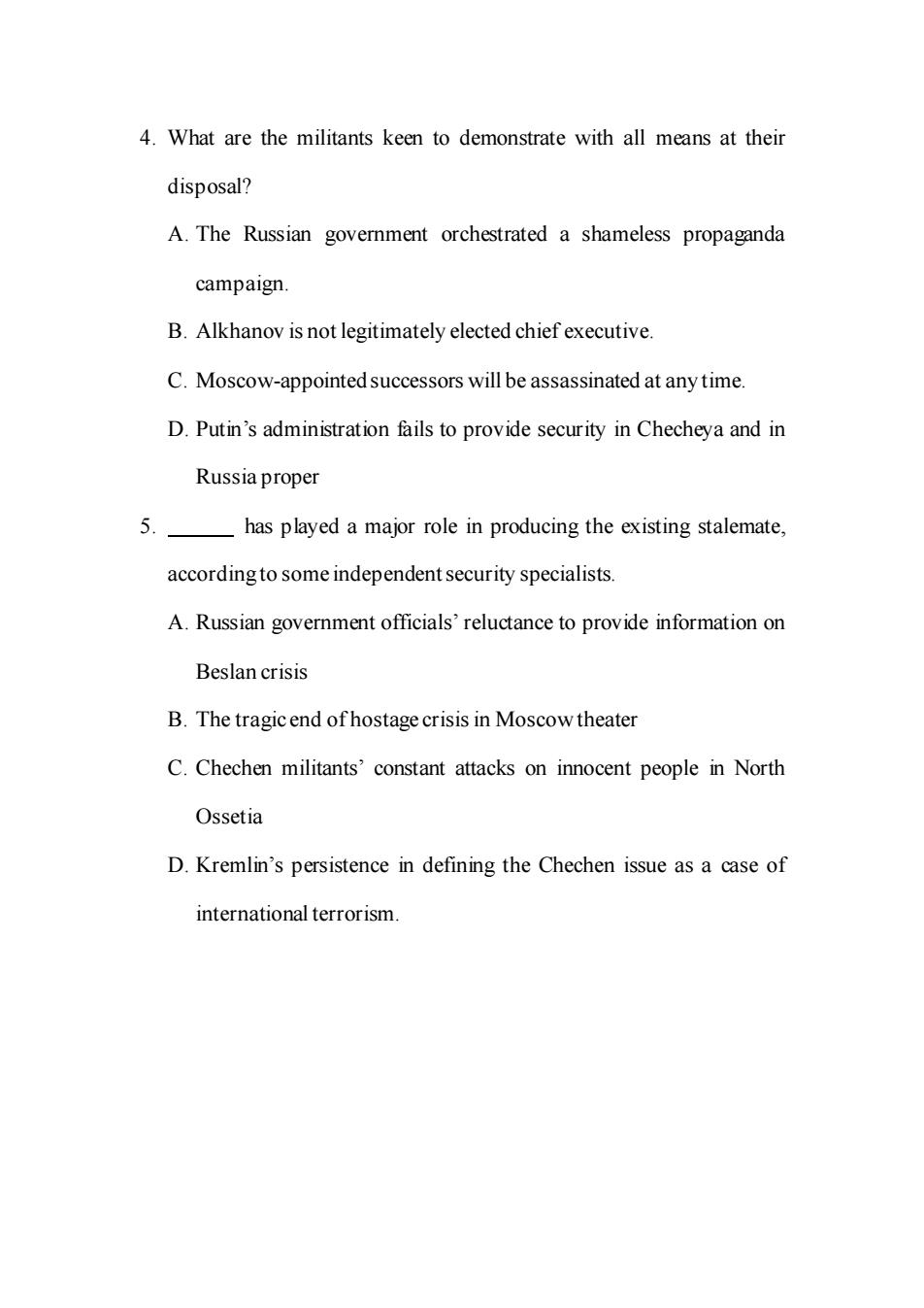
4.What are the militants keen to demonstrate with all means at their disposal? A.The Russian government orchestrated a shameless propaganda campaign. B.Alkhanov is not legitimately elected chief executive. C.Moscow-appointed successors will be assassinated at any time. D.Putin's administration fails to provide security in Checheya and in Russia proper 5. has played a major role in producing the existing stalemate. according to some independent security specialists. A.Russian government officials'reluctance to provide information on Beslan crisis B.The tragic end ofhostage crisis in Moscow theater C.Chechen militants'constant attacks on innocent people in North Ossetia D.Kremlin's persistence in defining the Chechen issue as a case of international terrorism
4. What are the militants keen to demonstrate with all means at their disposal? A. The Russian government orchestrated a shameless propaganda campaign. B. Alkhanov is not legitimately elected chief executive. C. Moscow-appointed successors will be assassinated at any time. D. Putin’s administration fails to provide security in Checheya and in Russia proper 5. has played a major role in producing the existing stalemate, according to some independent security specialists. A. Russian government officials’ reluctance to provide information on Beslan crisis B. The tragic end of hostage crisis in Moscow theater C. Chechen militants’ constant attacks on innocent people in North Ossetia D. Kremlin’s persistence in defining the Chechen issue as a case of international terrorism